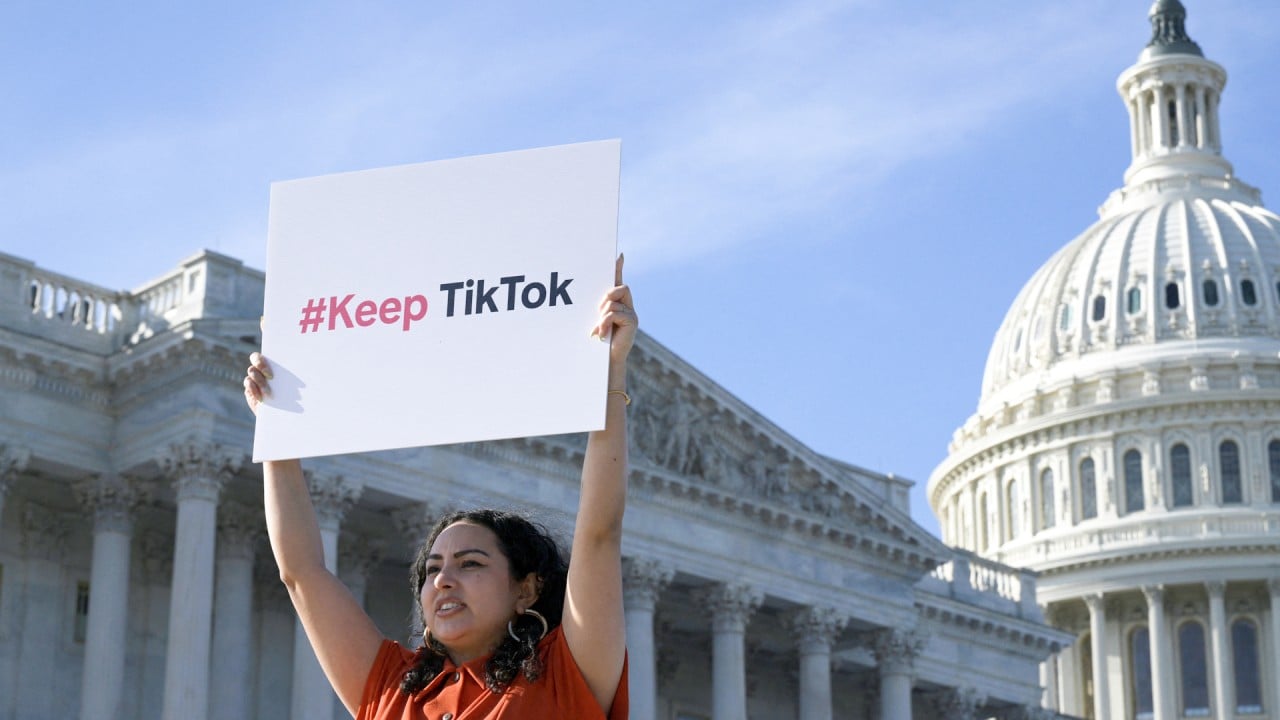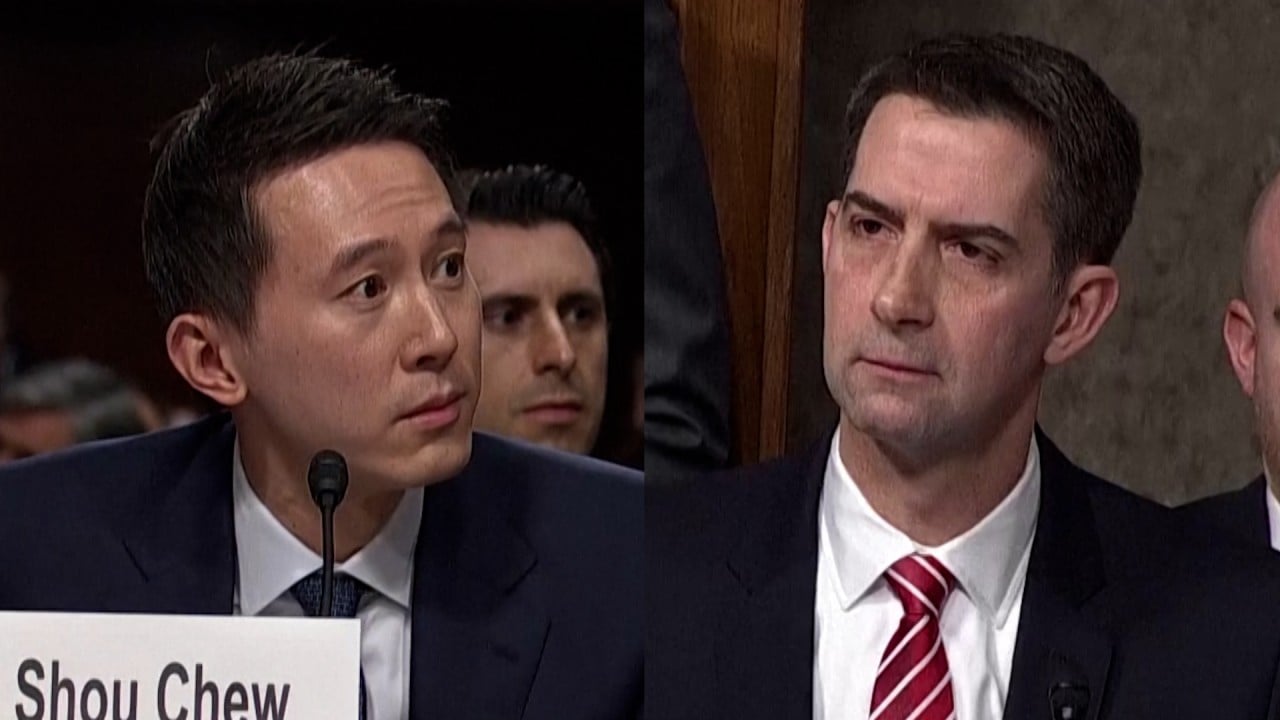Still, creators are unhappy, and see the move as hypocritical and infringing on their freedom of speech.
Those who want the app banned argue that TikTok may be forced into giving over user data to the Chinese government. They also fear TikTok could be suppressing or amplifying certain topics due to governmental pressure.
TikTok has repeatedly denied these allegations and made attempts to distance itself from ByteDance.
TikTok and its users have fought back, with the platform urging people to call their representatives and make their views heard.
Creators have enthusiastically mobilised against the bill and called out what they say is the hypocrisy of the US government. They claim it focuses heavily on one app while leaving other tech companies, such as Meta and Google, alone.
Leo LonDini, who has nine million followers, questioned how other companies with partial Chinese ownership seemingly have a free pass.
Tencent, a Chinese company, has a stake in Epic Games, Universal Group, Warner Music Group, Spotify, Tesla, Snapchat, and many others, for example, and a significant amount of Apple products are made in China.
TikTok gets more aggressive to counter US ban as ByteDance stays hands-off
TikTok gets more aggressive to counter US ban as ByteDance stays hands-off
“Listen, I don’t want any government, foreign or domestic, spying on me,” LonDini said. “And if our government could actually prove that Chinese companies are spying on us, well, then we have a decision to make, don’t we? Either we accept the risk, or we get rid of the app.”
The kicker is having a choice, he added.
“The choice that you took away from us.”
Brett Jansen, a creator who shares news on TikTok, said in a recent video she thought it was suspicious that the one app where information spreads freely will potentially be banned.
She described the bill as “fearmongering”, and accused the government of using people’s ignorance of TikTok and how it works to their advantage.

“Can someone please help me to understand how the US government is not doing the exact same thing that they are accusing China of doing?” she said. “Which is essentially controlling the narrative, controlling how our data is collected, and controlling how that data is used.”
Shira, a content creator who operates under the name shirashiraonthewall, told Business Insider last month that the ban is “a tactic to control the narrative”.
“TikTok has cultivated a huge community of people who discuss politics and current affairs without it being altered by propaganda,” she said. “A lot of us just want to know the truth.”
Without TikTok, Shira said she personally wouldn’t know about “some of the injustices occurring across the world”.
“It’s a valuable tool in seeking solidarity,” she said.
Why is Trump now defending TikTok in the US after trying to ban it?
Why is Trump now defending TikTok in the US after trying to ban it?
Shira also pointed to how a ban would harm her business, as she would no longer be able to make money from TikTok shop.
A ban would be “devastating” for her, she said, because years of her work would be “deleted forever”.
“I know that I will just have to accept what happens and move on to making content on Instagram Reels or Shorts,” she said. “But my growth and virality aren’t guaranteed there, as my content was uniquely made for TikTok.”
She said her future, as a result, is pretty uncertain. She’s worked with many large American corporations through the app, and more than half of her earnings come from brand deals with them.
A TikTok spokesperson told Business Insider in March that the legislation has a “predetermined outcome”, which is a total ban of TikTok in the US.
“The government is attempting to strip 170 million Americans of their Constitutional right to free expression,” they said. “This will damage millions of businesses, deny artists an audience, and destroy the livelihoods of countless creators across the country.”
Australia won’t follow US on TikTok ban, PM Albanese says
Australia won’t follow US on TikTok ban, PM Albanese says
Ben Stanley turned to TikTok when he started making artwork. He said he hasn’t been able to hold down a job due to his mental and physical health complications, so growing a following on TikTok has provided him a flexible way to earn an income.
It’s TikTok’s algorithm that has made him so successful, he told Business Insider.
“Should TikTok be banned, my business won’t be able to sustain itself because I don’t have the same kind of following anywhere else,” he said.
“So I would essentially be unemployed again, which would be a massive strain on my health as well as my wife and son on the way.”
A loss of TikTok would mean a loss of his business, he said, meaning his income would “shrivel and die”.
I feel like it’s doing what social media is supposed to do, which is connecting with other people and exploring new ideas,
Tahrea Sherman, a content creator who makes TikToks about pop culture, said she is worried that if TikTok is sold to a US company, then the government would suppress certain content.
This is a concern because TikTok is already hot on content moderation.
“I feel like it’s doing what social media is supposed to do, which is connecting with other people and exploring new ideas,” Sherman said.
“They want to change what makes the app great, and I think that’s very unfortunate.”
Trump says Biden would be ‘responsible’ for any TikTok ban
Trump says Biden would be ‘responsible’ for any TikTok ban
Catalina Goanta, an associate professor of private law and technology at Utrecht University in the Netherlands, said the bill in Congress only targets social media, which is “particularly odd and incoherent” considering there are security concerns around many other businesses that operate in the US, including Temu.
But it also targets the digital creator economy, which is expected to reach half a trillion dollars by 2027, according to Goldman Sachs. An overwhelming amount of the world’s most famous creators are US-based.
According to Statista, around 75 per cent of the marketing spending worldwide on social media stars was on US influencers in 2023.
“Losing TikTok would be a terrible blow not only to the livelihood of creators of all sizes in the US but also to the creative digital industry as a whole,” Goanta said.
“It is an economically nonsensical decision to bring down a poorly understood modern, creative, digital industry.”
There’s the potential of TikTok bringing a lawsuit if the bill passes this week.
“At the stage that the bill is signed, we will move to the courts for a legal challenge,” TikTok’s head of public policy in the Americas, Michael Beckerman, wrote in an internal memo to staff on Saturday.
“We’ll continue to fight, as this legislation is a clear violation of the First Amendment rights of the 170 million Americans on TikTok.”



